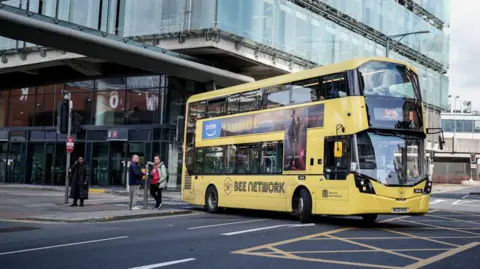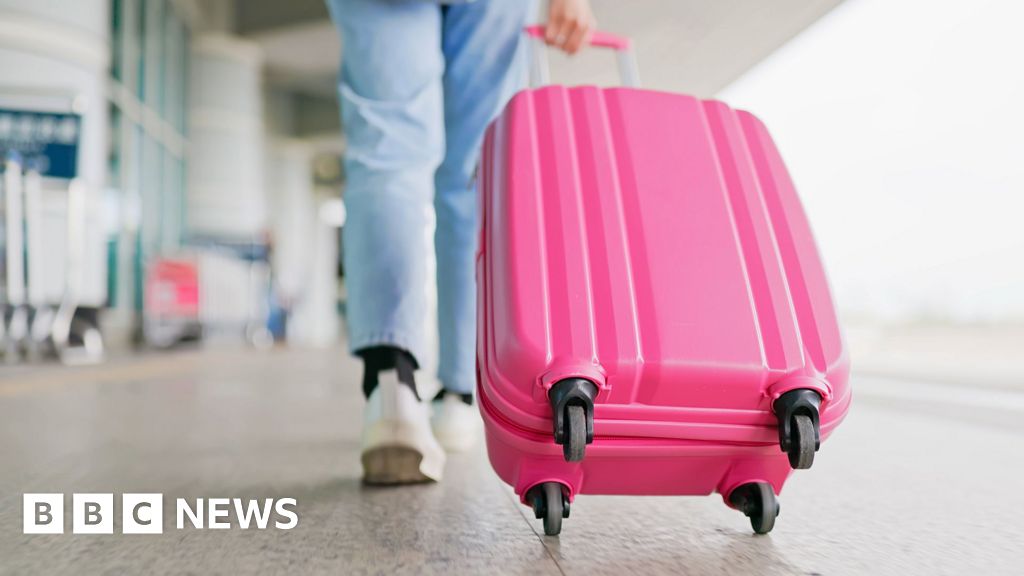ARTICLE AD BOX

 Getty Images
Getty Images
Parts of the bus network in Manchester have already been brought back under local control with the introduction of the 'Bee Network'
Local authorities in England would get new powers to run their own bus services under legislation being laid before Parliament on Monday, as the transport secretary promises to deliver a "bus revolution" that will save vital routes.
Currently only areas with metro mayors can introduce "franchising" to private companies.
Transport Secretary Louise Haigh said that after "decades of failed deregulation", "local leaders will finally have the powers to provide services that deliver for passengers".
Some industry figures, however, said minimum service level guarantees should also be set out as routes and timetables have faced cuts in recent years.
There are only a few areas in England where the local bus company is owned by the council.
The model - known as bus franchising - sees local authorities grant private companies the right to operate in a specific area, although the council maintains control over things like routes, timetables and fares.
Supporters say it means profits can be reinvested into services. For example, if the council puts money into things like bus lanes it sees a direct return - better services, more passengers and higher revenue from fares which can then be reinvested.
In the run-up to the general election, Labour pledged that it would hand all local transport authorities the power to run their own bus services and lift restrictions on new, publicly-owned bus operators.
But Shadow Transport Secretary Helen Whately suggested in a statement that "Labour's plans are unfunded" and the government needed to explain whether local authorities would be expected to raise tax or cut services to fund the proposal.
"Moreover, it won’t make a blind bit of difference for passengers."
"It won’t increase the number of services and they would much prefer to have the £2 fare cap extended at the Budget," she added, referring to a policy introduced by the Conservative government to cap single bus fares on participating bus routes at £2, which has been extended until December.
Buses are the most commonly used form of public transport in Great Britain.
But services have been in long-term decline, with the pandemic hitting passenger numbers and profits hard.
According to the Department for Transport, the number of local bus passenger journeys in England rose by 19.4% to 3.4 billion in the year ending March 2023.
This is much lower than usage levels before the pandemic, when journeys totalled 4.1 billion in the 12 months ending March 2020.
Until the 1980s, most bus services were delivered through publicly owned companies, often run by councils, but in 1986 services outside London were deregulated and privatised, leading to the mass sale of council bus companies.
In London a franchising system was introduced, with Transport for London deciding routes, timetables and fares and operators bidding to run services for a fixed fee.
This has contributed to the capital seeing an increase in bus use, with services less hit by cuts, in contrast to other parts of the country.
The newly-formed government has also launched a consultation on simplified guidance aimed at speeding up processes and reducing costs for local councils looking at bringing services into public control.
A "Better Buses Bill" will be put forward later on in this parliamentary session, which would look at measures for areas where leaders would not consider franchising.
Last year, Greater Manchester became the first place outside of London to bring bus services into public control since they were deregulated in the 1980s. The "Bee Network", where all-night services have been trialled, has been described as a success, despite facing some teething problems with delays.
More city regions intend to follow, and the government's plan would allow all local authorities across England to do the same.
Silviya Barrett, director of policy and research at Campaign for Better Transport, said giving local councils more power would create "a more reliable bus network for all".
"Whilst franchising may not be suitable for all areas, everyone should have access to a quality bus service without risk of it being cut, which is why we are also calling for a minimum service level guarantee and long-term, ringfenced funding for all local authorities," she said.
Emma Vogelmann, head of policy at Transport for All, told the BBC that buses play a crucial role for disabled people in the community.
"Often they are the only accessible form of public transport available...we're cautiously optimistic that greater devolution of services will enable local authorities to pick up the pace of change," she said.
Meanwhile, Adam Hug, transport spokesperson for the Local Government Association which represents councils, said the proposals marked a "step towards helping to restore public faith in local bus networks".

 8 months ago
32
8 months ago
32








 English (US) ·
English (US) ·